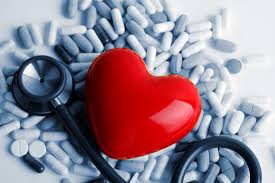
Diagnosed with Cancer? Your two greatest challenges are understanding cancer and understanding possible side effects from chemo and radiation. Knowledge is Power!
Learn about conventional, complementary, and integrative therapies.
Dealing with treatment side effects? Learn about evidence-based therapies to alleviate your symptoms.
Click the orange button to the right to learn more.
- You are here:
- Home »
- Blog »
- side effects ID and prevention »
- Chemothereapy-induced Cardiomyopathy- Metoprolol
Chemothereapy-induced Cardiomyopathy- Metoprolol

I am a long-term cancer survivor who developed a late stage side effect called “chemotherapy-induced cardiomyopathy (CIC).” In short, cardiotoxic chemotherapy given to me in ’95 to treat my blood cancer called multiple myeloma, caused CIC about 15 years later.
My cardio-oncologist prescribed metoprolol at our last appointment because my blood pressure had increased to about 130/90.
My understanding is that metoprolol is the go-to heart med. for people diagnosed with heart failure. Clearly, it was the go-to heart med for me and my chemotherapy-induced cardiomyopathy.
What are the short, long-term and late stage side effects of metoprolol?
Short-Term Side Effects
These side effects are most commonly experienced when starting the medication or adjusting the dose.
- Dizziness or Lightheadedness: Often due to the blood pressure-lowering effects.
- Fatigue: Common as the body adjusts to the medication.
- Headache: A common initial side effect.
- Cold Extremities: Due to reduced blood flow.
- Nausea: Gastrointestinal disturbances can occur.
- Slow Heart Rate (Bradycardia): Metoprolol can decrease the heart rate significantly.
Long-Term Side Effects
These may develop after prolonged use of metoprolol.
- Weight Gain: Some people may experience weight gain over time.
- Depression: There is a potential for mood changes, including depression.
- Memory Loss: Cognitive effects like memory impairment can occur.
- Sexual Dysfunction: Decreased libido or erectile dysfunction in men.
- Sleep Disturbances: Including insomnia and vivid dreams.
- Fatigue: Persistent tiredness that doesn’t resolve with time.
Late-Stage Side Effects
These effects may occur after long-term use or appear much later.
- Heart Failure: In some cases, particularly if there are other underlying conditions, long-term use can lead to worsening heart failure.
- Asthma Symptoms: In individuals predisposed to respiratory conditions, beta-blockers can exacerbate asthma or COPD symptoms.
- Diabetes: Long-term use can mask symptoms of hypoglycemia and may affect blood sugar levels.
- Thyroid Dysfunction: Beta-blockers can interfere with thyroid hormone levels and symptoms.
- Ocular Issues: Potential worsening of conditions like dry eyes.
Considerations
- Withdrawal Effects: Abruptly stopping metoprolol can lead to serious cardiovascular issues such as severe hypertension, angina, or myocardial infarction. It should be tapered off under medical supervision.
- Drug Interactions: Metoprolol can interact with other medications, which can modify its effects and increase the risk of side effects.
Upon taking a low dose of metoprolol my first day, I experienced several of the stated side effects. Having had a difficult time with conventional oncology, I decided to approach my heart health differently. I researched all of the heart healthy foods, supplements and lifestyle therapies I could.
Therapies such as:
- CoQ10-
- Curcumin-
- PPQ-
- Cocoa powder-
and many more. I was able to stabilize all of the main heart metrics as well as avoid all of the side effects brought on this toxic therapy.
I am not a cardiologist. I am not suggesting that others with heart failure do what I do. What I am suggesting is that if you have chemotherapy-induced cardiomyopathy you should understand that metaprolol comes with serious short, long-term and late stage side effects that you much know about and manage.
Are you a cancer survivor who underwent cardiotoxic chemo and worry about chemotherapy-induced cardiomyopathy some day? Or maybe you are a cancer survivor who already experienced heart damage from some chemo regimens you’ve been prescribed.
Either way, if you would like to learn more about evidence-based non-conventional heart health therapies email me at David.PeopleBeatingCancer@gmail.com
David Emerson
- Cancer Survivor
- Cancer Coach
- Director PeopleBeatingCancer
Metoprolol Succinate Side Effects by Likelihood and Severity
“Uses- This medication is a beta-blocker used to treat chest pain (angina), heart failure, and high blood pressure. Lowering high blood pressure helps prevent strokes, heart attacks, and kidneyproblems.This drug works by blocking the action of certain natural chemicals in your body (such as epinephrine) that affect the heart and blood vessels. This lowers heart rate, blood pressure, and strain on the heart…
To reduce your risk of side effects, your doctor may direct you to start this medication at a low dose and gradually increase your dose. Follow your doctor’s instructions carefully. The dosage is based on your medical condition and response to treatment.
Use this medication regularly to get the most benefit from it. To help you remember, take it at the same time each day. Do not suddenly stop taking this medication without consulting your doctor. Your condition may become worse when the drug is suddenly stopped.
For the treatment of high blood pressure, it may take several weeks before you get the full benefit of this drug. Keep taking this medication even if you feel well. Most people with high blood pressuredo not feel sick…
To prevent chest pain, a second heart attack, or migraine headaches, it is very important to take this medication regularly as prescribed. This drug should not be used to treat chest pain or migraines when they occur. Use other medications to relieve sudden attacks as directed by your doctor (for example, nitroglycerin tablets placed under the tongue for chest pain, “triptan” drugs such as sumatriptan for migraines). Consult your doctor or pharmacist for details.
Tell your doctor if your condition does not get better or if it gets worse (for example, your blood pressure readings remain high or increase, your chest pain or migraines occur more often).
“COMMON side effects
If experienced, these tend to have a Severe expression
- Depression
- Dizziness
- Low Blood Pressure
- Slow Heartbeat
If experienced, these tend to have a Less Severe expression
- A Skin Rash
- Abnormal Sexual Function
- Diarrhea
- Difficulty Sleeping
- Drowsiness
- Itching
- Low Energy
- Trouble Breathing
INFREQUENT side effects
If experienced, these tend to have a Severe expression
- Bronchospasm
- Chronic Heart Failure
- Constriction Of Blood Vessels Of The Extremities


